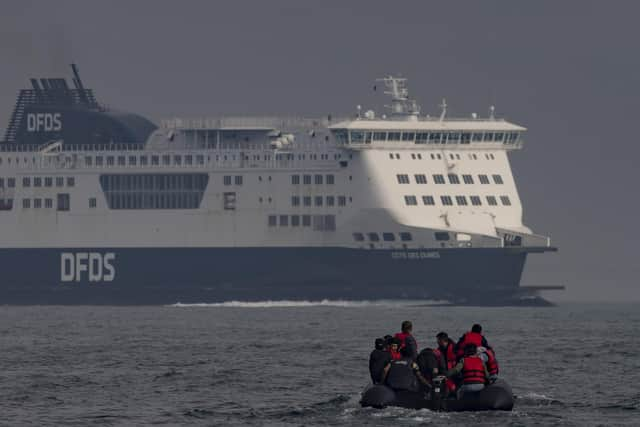We need to adopt the Australian approach to stop migrant Channel crossings - Bill Carmichael
It comes just over a year after one of the worst incidents of this kind in November 2021 when at least 27 migrants died after their dinghy sank in French waters.
This is simply intolerable, but the brutal truth is that the crossings will continue, and more desperate people will suffer horrible deaths, until something is done about it.
Advertisement
Hide AdAdvertisement
Hide AdPeople smugglers are making millions out of this evil trade and they don’t care if vulnerable people suffer as a result. They will keep on making blood money until someone finally has the courage to stop them.


The performance of Conservative led governments over the last 12 years on this issue has been completely woeful. Promise after promise to control our borders and reduce net immigration have been broken.
But to be fair, the lack of any meaningful action has not been entirely the government’s fault. Numerous Home Secretaries have put forward ideas to stop the people smugglers, but they have been delayed and blocked by an alliance of opposition parties in Parliament, campaign groups and well funded left wing lawyers.
Take for example the proposal by former Home Secretary Priti Patel to transfer asylum seekers to Rwanda - a perfectly safe country and popular tourist destination - for processing and resettlement.
Advertisement
Hide AdAdvertisement
Hide AdThe idea was to disrupt the business model of the smugglers by reducing demand. Would migrants be prepared to pay the smugglers £5,000 per head to cross the channel in overcrowded boats if there was a good chance they will end up in Rwanda, rather than the UK?
Would such a scheme work? The answer is that we don’t know and will probably never find out, because it has been successfully blocked and may never happen.
The first flight to Rwanda was supposed to take off in June of this year, but it was subjected to a large number of legal challenges and the plan was eventually kicked into the long grass when the European Court of Human Rights raised an objection.
The scheme is now mired in labyrinthine legal action that brings to mind Charles Dickens’ neverending case of Jarndyce vs Jarndyce in his novel, Bleak House. Don’t expect any progress in the near future.
Advertisement
Hide AdAdvertisement
Hide AdThis week Prime Minister, Rishi Sunak, announced a new range of measures to try to reduce the boat crossings.
They include a pledge to recruit more staff to clear the backlog of asylum claims by the end of next year.
There will also be 700 staff for a new unit monitoring small boats across the Channel, an end to the use of hotels for asylum seekers, and a plan to use disused holiday parks, military sites and former student halls instead. Housing migrants in hotels is costing the UK taxpayer almost £7m every single day.
There will be a specialist team to handle claims from Albania - a safe country that hasn’t seen armed conflict in a quarter of a century - where migrant numbers have rocketed and now consist of about 35 per cent of the 40,000 plus entering the UK on small boats this year.
Advertisement
Hide AdAdvertisement
Hide AdAll this seems useful, and perhaps some of it could work, but what is the betting that left wing lawyers will pour a bag of sugar into the petrol tank to gum up the engine and the whole thing will grind to a halt as usual?
The frustrating thing is that we know how to deal with this problem quickly and humanely, because we have a recent example of a country doing exactly that.
In 2012 more than 25,000 migrants a year were arriving in Australia in small boats from places like Indonesia, and many were drowning in the attempt.
There was a thriving people smuggling racket, with migrants travelling from as far away as Iraq and Afghanistan, to Indonesia for boat crossings.
Advertisement
Hide AdAdvertisement
Hide AdThe Australian government initiated a policy that can be summed up in three words - “stop the boats”.
Offshore processing centres were set up for migrants in Nauru and Papua New Guinea, and it was made clear that nobody attempting to enter Australia by these illegal routes would ever be allowed to settle in the country. Migrant boats attempting to reach Australia were turned back by the Australian military.
The result? By 2014 the number of maritime arrivals had dropped dramatically to 157. By the following year it was zero.
Quite simply it worked. If we want to stop people drowning in the Channel, we know exactly what to do.